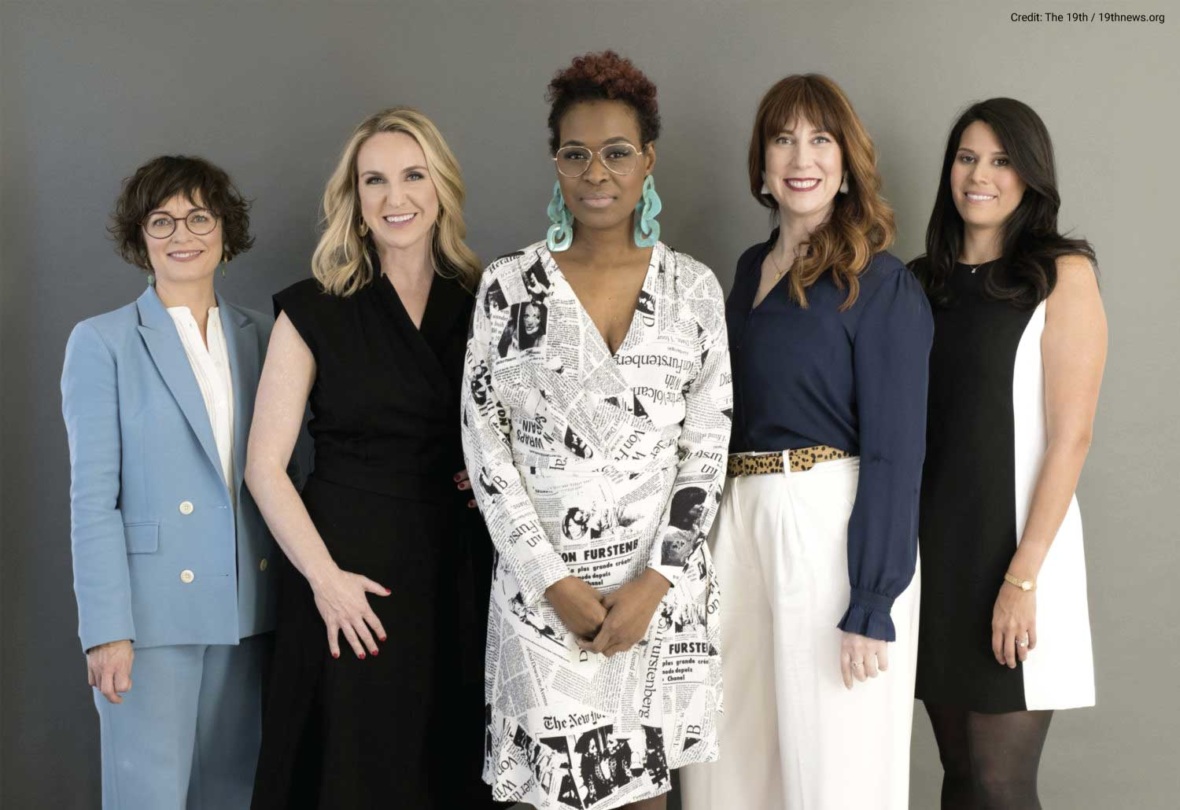
Upon Reflection: The 19th* — a nonprofit news startup made for the moment
I first met Emily Ramshaw at a dinner in Austin, Texas, in November 2019. She had just left The Texas Tribune, where she was its highly respected editor-in-chief, to take a giant leap of faith.
She was about to launch a nonprofit online news organization devoted to covering politics and policy through a gender lens, with a particular focus on women from historically marginalized communities — a perspective that she believed was sorely missing in American journalism.
We made plans to meet again in Austin in March, during South by Southwest, but as pandemic-driven lockdowns were imposed across the nation, the festival was canceled. Ramshaw and her colleagues, who had released details about their new newsroom at the end of January, saw their fundraising plummet and their ambitious plans jeopardized by the uncertainty suddenly gripping the world.
“We were in dire straits,” Ramshaw recalled when we spoke last week. “If a news organization launches in a pandemic, does anybody notice?”
She, co-founder Amanda Zamora and their team considered postponing operations for a year, but decided that the pandemic was going to disproportionately affect the very communities they wanted to focus on. With a fresh infusion of cash from two major funders as “a security blanket,” Ramshaw said, “we went for it. And thank God we did.”
In the past year, The 19th* has rocketed onto the national stage. In the process, it has tapped into the zeitgeist in a way that Ramshaw and Zamora could have neither planned nor foreseen.
(The name comes from the 19th Amendment to the U.S. Constitution, which granted women the right to vote a century ago; the asterisk, the news organization’s website explains, “is a visible reminder of those who have been omitted from our democracy.”)
As more than 2,000 local newspapers in the United States have closed in the past 15 years and many others have trimmed their staffs, nonprofit newsrooms like The Texas Tribune and The 19th* have emerged as new journalistic models. While they have by no means filled this critical void, they do provide valuable coverage of specific cities, regions and interests.
The 19th*’s initial year was more eventful than most. As issues and opportunities arose, it broke ground and broke news.
On May 11, two weeks before George Floyd’s death led to massive protests for racial justice, it was the first national news outlet to write about the fatal shooting of Breonna Taylor by Louisville, Kentucky, police, elevating both the incident and the news organization. This report (which also appeared in The Washington Post, a news partner) was, Ramshaw said, “a breakout moment for us.”
On Aug. 3, its examination of the disproportionate impact of the pandemic on women — “America’s first female recession” — was published on the front page of USA Today. The next week, editor-at-large Errin Haines, the author of the Breonna Taylor piece, landed the first interview with Sen. Kamala Harris after Harris was selected by Joe Biden as the Democrats’ vice presidential candidate — the first African American and Asian American woman to hold that position.
Then there were the opportunities, Ramshaw said, “to make lemonade out of lemons.”
A formal launch event planned at the Museum of the American Revolution in Philadelphia in August was scrapped because of pandemic restrictions. Instead, it became a five-day “virtual summit” featuring, among others, Hillary Clinton, Stacey Abrams, Melinda Gates and Meghan, the Duchess of Sussex, along with performances by the New York Philharmonic, Meryl Streep, Zoë Saldaña and The Go-Go’s, the pioneering all-woman band.
“Suddenly, we didn’t have 500 people in a museum ballroom,” Ramshaw said. “We had about 200,000 people tuning in” worldwide.
This higher profile, combined with timely journalism and an expanded and talented staff, has paid dividends. After raising $6.67 million in 2020, Ramshaw and her team were able to increase their budget by 50% this year. Four-fifths of that fundraising total came from foundation and individual gifts; the balance was nearly evenly divided between corporate underwriting of events and membership subscriptions. Most impressively, they exceeded their first-year goal of 1,000 paying members nearly tenfold, at rates starting at $5 a year. (Full disclosure: I was one of them.)
The 19th* is also producing a steady stream of quality journalism and making it widely available. It has gone from publishing once weekly to daily or close to it, and averages 12 to 15 stories a week. Its journalism is free to consumers and free for other outlets to republish; it has partnered with the USA Today Network, which includes more than 260 daily news platforms, Univision, which is translating and distributing its reporting in Spanish. Other news organizations can pick up pieces from The 19th*’s site.
“It’s just been the most magical year, probably under the most difficult circumstances imaginable,” Ramshaw said. She hasn’t even met most of her 26-member team in person, she said — not to mention missing the camaraderie and collaboration of working together in a newsroom.
Meanwhile, The 19th* continues to evolve. Ramshaw pointed to the decision at the start of this year to include the LGBTQ+ community in its mission. “One thing we learned in our inaugural year is that women aren’t the only people marginalized based on their gender,” she said.
She and her colleagues also revised the organization’s values statement by dropping the word “nonpartisan” as an aspirational standard and replacing it with “independent.”
“The aim was to say we think the term ‘nonpartisan,’ in many ways, has been co-opted to mean bothsidesism or equal time,” Ramshaw said. “We want to be absolutely clear that we emphasize the veracity of facts and truths. Our storytelling is rooted in evidence and science and fact. And we won’t be uncomfortable in calling truth ‘truth’ and lies ‘lies.’”
The 19th* may be a hard act to follow, but its breakout success still offers lessons for others in the nonprofit journalism space:
- Start with a clear vision and sense of mission.
- Set high standards for the journalism, including independence and a commitment to fact-based storytelling.
- Enroll established partners that will share and amplify your work.
- Create diverse revenue streams and, ideally, enlist deep-pocketed donors who can step up in a pinch.
And, when the world seems to turn upside down, find a way to make lemonade out of lemons.
Read more from this series:
- Apr. 22: Spotlight — a special resonance
- Mar. 25: How I became a ‘pinhead’ — a news literacy lesson
- Mar. 11: Fighting the good fight to ensure that facts cannot be ignored
- Feb. 26: Students’ enduring rights to freedoms of speech and the press
- Feb. 11: We need news literacy education to bolster democracy
- Jan 28: 13 lessons from our first 13 years
- Jan. 14: Media needs to get COVID-19 vaccine story right
- Dec. 17: Journalism’s real ‘fake news’ problem also reflects its accountability
- Dec. 3: Combating America’s alternative realities before it’s too late
- Nov. 12: “Kind of a miracle,” kind of a mess, and the case for election reform
- Oct. 29: High stakes for calling the election
- Oct. 15: In praise of investigative reporting
- Oct. 1: How to spot and avoid spreading fake news
